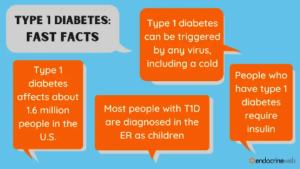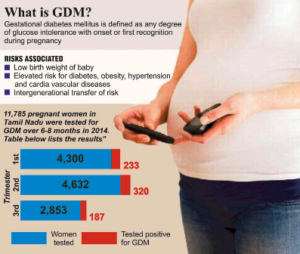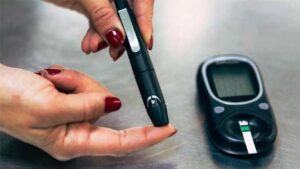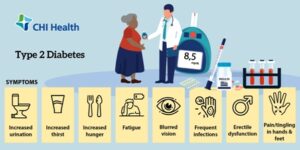Learn about diabetes – DICOMAI urges Nigerians
As Nigeria joins the rest of the world to mark the 2022 World Diabetes Day (WDD) on November 14, a non-governmental organization, Diabetes Control Media Advocacy Initiative (DICOMAI) has urged Nigerians to learn more about diabetes and its avoidable risks to reduce increasing burden of the disease and unnecessary deaths in the country.
In a statement signed by its Chairman Board of Trustees, Dr. Afoke Isiavwe and Executive Director, Sam Eferaro, DICOMAI said awareness about the disease remains a key factor in saving the lives of several people walking around in every part of the country who are oblivious of the fact that they have the disease and those already diagnosed who do not know how to manage or control it.
Referring to the theme of this year’s edition of WDD: “Education to protect tomorrow” DICOMAI disclosed that the aim of the campaign is to focus on the need for better access to quality diabetic education both for healthcare professionals and people living with diabetes.
The statement further urged Nigerians to be aware that factors such as a family history of diabetes, overweight, unhealthy diet, physical inactivity, increasing age, high blood pressure, poor nutrition during pregnancy, impaired glucose tolerance and history of gestational diabetes have been closely associated with type 2 diabetes, the commonest diabetes type and advised families to recognize their presence so as to prevent the condition and its deadly consequences.
“It’s another period of the year when the world focuses attention on diabetes, a disease that affects about 537 million adults and 1.1 million children worldwide – including more than five million Nigerian adults. Every year, diabetes reportedly kills about 4 million people worldwide and is associated with serious consequences such as stroke, blindness, limb amputation, kidney disease and cardiovascular disease.
“DICOMAI aligns itself with the objective of the theme for this year and hereby calls on all Nigerians to be actively involved in commemorating the event and seize every opportunity to learn about diabetes, it’s dangerous consequences and how to prevent it.
“It is important to note that diabetes is on the increase globally, and one in 10 adults currently live with it. According to WHO, almost half of about 537 million people living with it worldwide do not know they have it thus, it is estimated that 1 in 2 people currently living with diabetes is undiagnosed.”
The statement further informed that Diabetes remains one of the largest global health emergencies of the 21st century, largely because of its severe and deadly consequences.
“This is a disease that affects virtually all organs of the body, resulting in loss of vision, dental problem, kidney failure, cardiovascular disease, lower limb amputation, sexual dysfunction, among others, when not properly controlled – sadly a situation faced by Nigerians living with diabetes today.
“Yet, many cases of type 2 diabetes, the commonest type, can be prevented through a healthy lifestyle. Also, a good control by affected individuals can prevent the deadly consequences of the condition.
“It is in the light of this that DICOMAI urges members of the public to learn more about the warning signs of diabetes and also find out if they are at risk of the disease.
“Also, people living with diabetes need the support of their family to cope with the financial and emotional pressure that accompanies a diabetes diagnosis. There’s a great need to embrace a healthy diet, increased physical activity and maintaining a healthy body weight, all of which can be easily achieved when every member of the family is involved.”
The organizations also observed that awareness about diabetes remains too low in the country, saying this is responsible for the detection of a large number of cases only when complications have set in.
“There’s a great need for everyone to recognize some signs of diabetes so that appropriate action could be taken towards early management, to prevent complications. Such signs include: Feeling more thirsty than usual; frequent urination; loss of weight; feeling tired and weak; feeling irritable or having other mood changes; having blurry vision; sores that won’t heal; developing infections, such as gum, skin and vaginal infections, among others.”
DICOMAI therefore called on governments, healthcare providers and other stakeholders to intensify their efforts in providing adequate information to assist the public in recognizing the signs and symptoms of the condition and the available preventing options.
Facts about diabetes
Overview
Diabetes is a chronic disease that occurs either when the pancreas does not produce enough insulin or when the body cannot effectively use the insulin it produces. Insulin is a hormone that regulates blood glucose. Hyperglycaemia, also called raised blood glucose or raised blood sugar, is a common effect of uncontrolled diabetes and over time leads to serious damage to many of the body’s systems, especially the nerves and blood vessels.
In 2014, 8.5% of adults aged 18 years and older had diabetes. In 2019, diabetes was the direct cause of 1.5 million deaths and 48% of all deaths due to diabetes occurred before the age of 70 years. Another 460 000 kidney disease deaths were caused by diabetes, and raised blood glucose causes around 20% of cardiovascular deaths (1).
Between 2000 and 2019, there was a 3% increase in age-standardized mortality rates from diabetes. In lower-middle-income countries, the mortality rate due to diabetes increased 13%.
By contrast, the probability of dying from any one of the four main non-communicable diseases (cardiovascular diseases, cancer, chronic respiratory diseases or diabetes) between the ages of 30 and 70 decreased by 22% globally between 2000 and 2019.
Type 2 diabetes
Type 2 diabetes (formerly called non-insulin-dependent, or adult-onset) results from the body’s ineffective use of insulin. More than 95% of people with diabetes have type 2 diabetes. This type of diabetes is largely the result of excess body weight and physical inactivity.
Symptoms may be similar to those of type 1 diabetes but are often less marked. As a result, the disease may be diagnosed several years after onset, after complications have already arisen.
Until recently, this type of diabetes was seen only in adults but it is now also occurring increasingly frequently in children.
Type 1 diabetes
 Type 1 diabetes (previously known as insulin-dependent, juvenile or childhood-onset) is characterized by deficient insulin production and requires daily administration of insulin. In 2017 there were 9 million people with type 1 diabetes; the majority of them live in high-income countries. Neither its cause nor the means to prevent it are known.
Type 1 diabetes (previously known as insulin-dependent, juvenile or childhood-onset) is characterized by deficient insulin production and requires daily administration of insulin. In 2017 there were 9 million people with type 1 diabetes; the majority of them live in high-income countries. Neither its cause nor the means to prevent it are known.
Symptoms include excessive excretion of urine (polyuria), thirst (polydipsia), constant hunger, weight loss, vision changes, and fatigue. These symptoms may occur suddenly.
Gestational diabetes
 Gestational diabetes is hyperglycaemia with blood glucose values above normal but below those diagnostic of diabetes. Gestational diabetes occurs during pregnancy
Gestational diabetes is hyperglycaemia with blood glucose values above normal but below those diagnostic of diabetes. Gestational diabetes occurs during pregnancy
Women with gestational diabetes are at an increased risk of complications during pregnancy and at delivery. These women and possibly their children are also at increased risk of type 2 diabetes in the future.
Gestational diabetes is diagnosed through prenatal screening, rather than through reported symptoms.
Impaired glucose tolerance (IGT) and impaired fasting glycaemia
Impaired glucose tolerance (IGT) and impaired fasting glycaemia (IFG) are intermediate conditions in the transition between normality and diabetes. People with IGT or IFG are at high risk of progressing to type 2 diabetes, although this is not inevitable.
Health impact
Over time, diabetes can damage the heart, blood vessels, eyes, kidneys, and nerves.
- Adults with diabetes have a two- to three-fold increased risk of heart attacks and strokes (2).
- Combined with reduced blood flow, neuropathy (nerve damage) in the feet increases the chance of foot ulcers, infection and eventual need for limb amputation.
- Diabetic retinopathy is an important cause of blindness and occurs as a result of long-term accumulated damage to the small blood vessels in the retina. Close to 1 million people are blind due to diabetes (3).
- Diabetes is among the leading causes of kidney failure (4).
- People with diabetes are more likely to have poor outcomes for several infectious diseases, including COVID-19.
Prevention
Lifestyle measures have been shown to be effective in preventing or delaying the onset of type 2 diabetes. To help prevent type 2 diabetes and its complications, people should:
- achieve and maintain a healthy body weight;
- be physically active – doing at least 30 minutes of regular, moderate-intensity activity on most days. More activity is required for weight control;
- eat a healthy diet, avoiding sugar and saturated fats; and
- avoid tobacco use – smoking increases the risk of diabetes and cardiovascular disease.
Diagnosis and treatment
 Early diagnosis can be accomplished through relatively inexpensive testing of blood glucose.
Early diagnosis can be accomplished through relatively inexpensive testing of blood glucose.
Treatment of diabetes involves diet and physical activity along with lowering of blood glucose and the levels of other known risk factors that damage blood vessels. Tobacco use cessation is also important to avoid complications.
Interventions that are both cost-saving and feasible in low- and middle-income countries include:
- blood glucose control, particularly in type 1 diabetes. People with type 1 diabetes require insulin, people with type 2 diabetes can be treated with oral medication, but may also require insulin;
- blood pressure control; and
- foot care (patient self-care by maintaining foot hygiene; wearing appropriate footwear; seeking professional care for ulcer management; and regular examination of feet by health professionals).
Other cost saving interventions include:
- screening and treatment for retinopathy (which causes blindness);
- blood lipid control (to regulate cholesterol levels);
- screening for early signs of diabetes-related kidney disease and treatment.
Courtesy: WHO







0 Comments
No Comments Yet!
You can be first to comment this post!